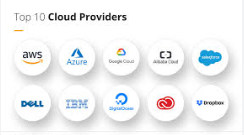The cloud computing market continues to dominate the digital transformation landscape in 2025. With businesses relying more on cloud solutions for scalability, security, and innovation, selecting the right cloud vendor has become a mission-critical decision. Giants like Amazon Web Services (AWS), Microsoft Azure, and Google Cloud Platform (GCP) lead the industry, but each offers unique advantages depending on your business needs.
This article provides a detailed comparison of the top cloud vendors, exploring their features, pricing, market position, and best-fit use cases. Whether you’re a startup, enterprise, or IT professional, understanding these differences will help you make an informed decision.
The Global Cloud Market in 2025
According to Gartner, worldwide spending on public cloud services is projected to reach $679 billion in 2025, up from $563 billion in 2023. The market is largely dominated by AWS, Azure, and Google Cloud, collectively controlling over 65% of the market share.
The competition is intense, with vendors innovating in AI, machine learning, and multi-cloud strategies. Let’s dive into the leading players individually.
Amazon Web Services (AWS)
Overview
AWS remains the largest cloud vendor in 2025, with nearly 30% market share. Known for its scalability and global reach, AWS offers over 200 fully featured services, ranging from compute and storage to advanced AI tools.
Strengths
- Global Infrastructure: Largest network of data centers across more than 30 geographic regions.
- Diverse Services: Offers unmatched services including EC2, S3, RDS, and advanced AI/ML tools.
- Strong Ecosystem: Extensive third-party integrations and enterprise partnerships.
Weaknesses
- Complex Pricing: The pay-as-you-go model can be confusing and lead to cost overruns.
- Learning Curve: Some services are highly technical, requiring skilled teams.
Best For
- Enterprises needing global scalability.
- Businesses requiring AI/ML workloads and customizable infrastructure.
- Companies with complex, large-scale deployments.
Microsoft Azure
Overview
Azure is AWS’s closest competitor, holding around 25% market share. It is particularly strong in hybrid and enterprise solutions, thanks to Microsoft’s dominance in productivity software and enterprise IT.
Strengths
- Hybrid Cloud Capabilities: Seamless integration with on-premises data centers.
- Microsoft Ecosystem: Works flawlessly with tools like Office 365, Teams, and Dynamics 365.
- AI & Analytics: Advanced tools such as Azure Synapse Analytics and Cognitive Services.
Weaknesses
- Service Outages: Some customers have reported higher-than-average downtime compared to AWS.
- Complexity in Management: Multi-service integrations can be challenging.
Best For
- Enterprises already using Microsoft products.
- Hybrid and multi-cloud strategies.
- Businesses in regulated industries needing compliance support.
Google Cloud Platform (GCP)
Overview
GCP has gained significant traction, capturing around 12% of market share in 2025. Google leverages its strengths in AI, big data, and analytics to carve out a unique position.
Strengths
- Data & Analytics Leader: Industry-leading tools such as BigQuery, TensorFlow, and Vertex AI.
- AI & Machine Learning: Advanced AI capabilities for innovation-focused businesses.
- Open Source Contributions: Strong support for Kubernetes, Anthos, and multi-cloud environments.
Weaknesses
- Smaller Global Footprint: Fewer data centers compared to AWS and Azure.
- Enterprise Adoption: Still building trust among large-scale enterprises.
Best For
- Startups and businesses focused on AI/ML-driven innovation.
- Companies needing advanced analytics and open-source flexibility.
- Developers seeking a cloud-native environment.
Other Notable Cloud Vendors
While AWS, Azure, and GCP dominate, several regional and niche players also provide strong offerings:
- IBM Cloud: Strong in hybrid and AI-driven enterprise solutions.
- Oracle Cloud: Best for businesses relying heavily on Oracle databases.
- Alibaba Cloud: Leading provider in Asia, growing globally.
These providers often serve specific needs or regions, making them valuable for specialized use cases.
Cloud Vendor Comparison Table
| Feature | AWS | Microsoft Azure | Google Cloud Platform |
|---|---|---|---|
| Market Share (2025) | ~30% | ~25% | ~12% |
| Strengths | Global reach, diverse services | Hybrid solutions, Microsoft integration | AI, ML, big data expertise |
| Weaknesses | Complex pricing, steep learning curve | Service outages, complexity | Smaller footprint, adoption lag |
| Best For | Enterprises, global scale | Microsoft-centric enterprises | AI/ML startups, analytics |
Key Factors to Consider When Choosing a Cloud Vendor
When deciding which provider is best for your business, consider:
- Cost and Pricing Models: Evaluate on-demand, reserved, and spot pricing options.
- Performance & Availability: Check regional data center availability and uptime SLAs.
- Integration with Existing Tools: Consider compatibility with current IT infrastructure.
- Security & Compliance: Ensure the vendor meets industry regulations (GDPR, HIPAA, etc.).
- Innovation Roadmap: Look for future-ready capabilities like AI, serverless computing, and IoT.

Conclusion
Choosing the right cloud vendor in 2025 is not a one-size-fits-all decision. AWS is the leader in scalability and global infrastructure, Azure excels in enterprise and hybrid solutions, and Google Cloud stands out for AI and analytics.
The best choice depends on your company’s priorities—whether it’s cost efficiency, innovation, or integration with existing systems.
To dive deeper, check out our related guides on:
By carefully weighing your needs against each vendor’s strengths, you can confidently select the provider that will power your organization’s digital future.
External Sources:
